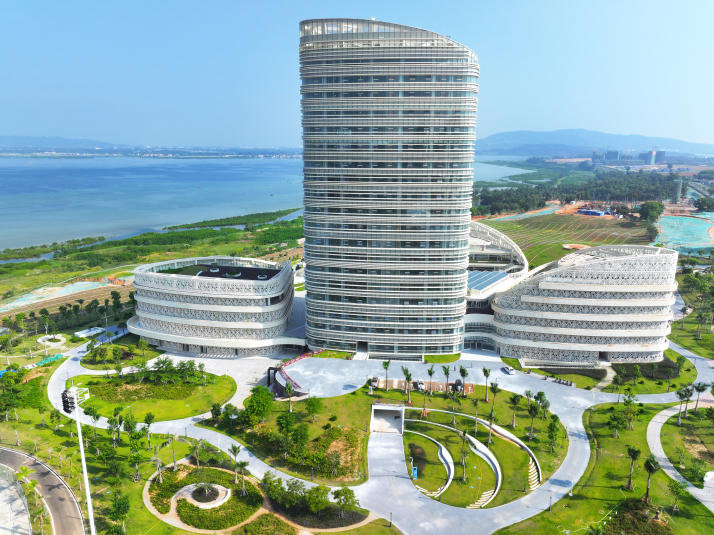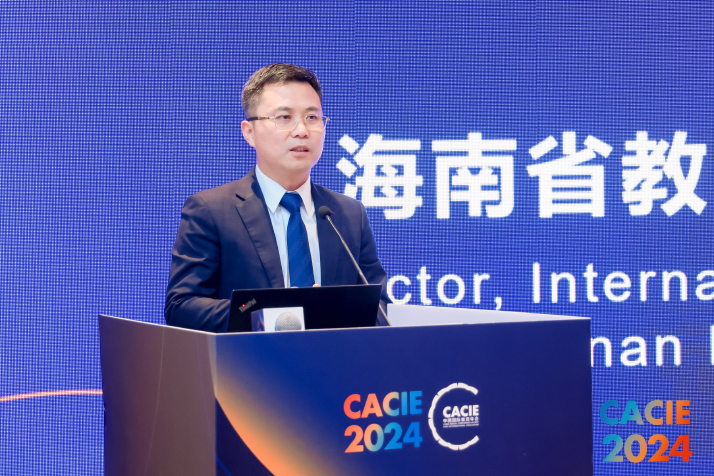| China |
| From internships to international resources, Hainan explores new academic horizons | |
|
|
 The public library in the Hainan Lingshui Li'an International Education Innovation Pilot Zone in Lingshui County, Hainan Province, on June 3 (XINHUA)
Perched on the 18th parallel north—often called the "golden latitude" for its optimal climate and environment conditions, shared by renowned attractions like Bali in Indonesia, the Maldives, and Hawaii of the United States—the southernmost Chinese island province of Hainan has, over the past few decades, garnered national acclaim for its thriving tourism, senior healthcare and cultural sectors. Recently, Hainan has also gained attention as a burgeoning hub for international education within China. "Hainan is establishing the Hainan Lingshui Li'an International Education Innovation Pilot Zone to advance educational openness, a vision supported by the success of its free trade port development," Tang Zhenfu, Director of the International Cooperation and Exchange Office at the Hainan Provincial Department of Education, said during a sub-forum at the China Annual Conference and Expo for International Education held in Beijing on October 31. Tang added that the pilot zone will host campuses of top-tier universities and joint colleges established through partnerships between institutions in China and other countries. "With Hainan's geographic and policy advantages, the pilot zone will serve both Chinese students seeking an international education within China and international students from Southeast Asia aiming to study here," Tang added. In June 2019, the Hainan Provincial Government and the Ministry of Education (MOE) jointly launched an initiative to create a high-level educational opening-up pilot zone. By September 2022, the Hainan Lingshui Li'an International Education Innovation Pilot Zone was officially inaugurated in Lingshui County, with the mission to nurture cooperation between domestic and overseas higher education institutions. As of this summer, the pilot zone had accommodated over 5,000 students and faculty from 22 newly founded institutions, including four institutions ranked in the top 100 in the QS World University Rankings by British global higher education analyst Quacquarelli Symonds.  Hang Zhenfu, Director of the International Cooperation and Exchange Office at the Hainan Provincial Department of Education, speaks during a sub-forum at the China Annual Conference and Expo for International Education held in Beijing on October 31 (COURTESY PHOTO)
Distinct advantages According to Yang Zhao, an official from the administrative bureau of the pilot zone, the province holds distinct advantages in developing international education. "Geological advantages aside, Hainan also has a whole package of favorable policies in place for attracting international investment in the education field," Yang said. China aims to build the whole of Hainan Island into a globally influential and high-level free trade port (FTP) by the middle of the century, with boosting educational opening up among its priorities. Yang further stressed that the local government will offer financial support to higher learning institutions in the pilot zone, assist with infrastructure and facility development, aid in recruitment promotion, and provide discounted land. "Students and staff will have free access to public infrastructure in the pilot zone, including public libraries, labs and exercise grounds built by the government," Yang said. "Furthermore, all overseas institutions settled in the pilot zone will benefit from the policy advantages of the Hainan FTP in areas such as liberalization and facilitation of trade, investment, cross-border flow of funds, personnel exit and entry, transportation and secure data flow. Foreign employees will also receive discounts on purchasing apartments and vehicles, and education and medical support for their families." Germany's Bielefeld University of Applied Sciences (BUAS) is the first independently operated foreign higher learning institution in China. Its Hainan campus opened in May 2023, and enrollment rose from 140 students last year to 280 this summer. Hainan is the first province in China that allows overseas academic institutions to operate independently. "We use the same curriculum as the BUAS campus in Germany, one that is up to European Union standards, and have received great student feedback," Jürgen Ke, headmaster of the school's Hainan campus, told news portal Jyb.cn, the MOE's official website. "Additionally, students who earn sufficient credits and meet the language proficiency requirements are welcome to study at the BUAS campus in Germany, enabling them to obtain diplomas from both institutions." "Hainan is an ideal location for global education institutions. The development of the FTP and thriving industries on the island offer students numerous internship opportunities, while the supportive policy package provides great convenience for overseas staff," Ke said. "Studying in Hainan is extremely convenient," Lei Yuke, an artificial intelligence (AI) major at the Coventry College of Communication University of China (CUC), a collaborative institution of Britain's Coventry University and CUC in Lingshui, told newspaper Guangming Daily. "It feels as if you are actually studying abroad. All our courses are conducted in English, and we have access to extensive international resources." Playing into strengths Tang said many higher learning institutions in the pilot zone have launched programs aligned with Hainan's future development, including AI, digital media technology, data science and technology, tourism management, sports management, international business management, and foreign trade management. These programs provide students with multiple internship opportunities and strong job prospects upon graduation, in turn boosting the institutions' employment rates and reputations, and contribute to the province's economic growth and industrial transformation. "Hainan's traditional strengths lie in the cultural, tourism and sport industries, and the influx of international education resources will generate strong momentum in these areas," Tang elaborated. "Moreover, Hainan is committed to fostering new growth drivers, with programs in new energy, big data and AI poised to help fulfill the province's future potential." According to official statistics, four prominent industries—tourism, services, advanced technology and tropical agriculture—contributed to more than 60 percent of Hainan's economic growth in 2023. In tandem with these leading industries and local advantages, higher learning institutions in the pilot zone, including University of Electronic Science and Technology of China's Glasgow College Hainan, Beijing Sport University's Alberta International School of Recreation, Sport and Tourism, and Beijing University of Posts and Telecommunications' Queen Mary School Hainan, have set up related programs. The pilot zone is expected to be home to both academic institutions and enterprises, boosting the integrative development of both sides. "We are learning from the integrated operation mode of enterprises and academic institutions of the Brest Business School [in France], while making adjustments according to the needs of institutions in the pilot zone," Jiang Zhengxin, an enterprise representative said at the forum. "The refined mode has proven effective, which gives us the confidence to introduce more educational and business resources from Europe." "The pilot zone consists of two phases. The first phase, or the education zone, is already operational. The second phase, launched in March, is dedicated to promoting the integrated development of local industries and education. Upon completion, the latter will play a major role in attracting enterprises and investments aligned with the programs offered in the education zone," Yang explained. "This operational model is mutually beneficial—the education institutions gain a recruiting advantage by being incorporated into the integrated development zone, while said zone in turn benefits from the institutions' talent pool, research resources and amenities and facilities," Yang added. Copyedited by Elsbeth van Paridon Comments to zhangyage@cicgamericas.com |
|
||||||||||||||||||||||||||||||
|